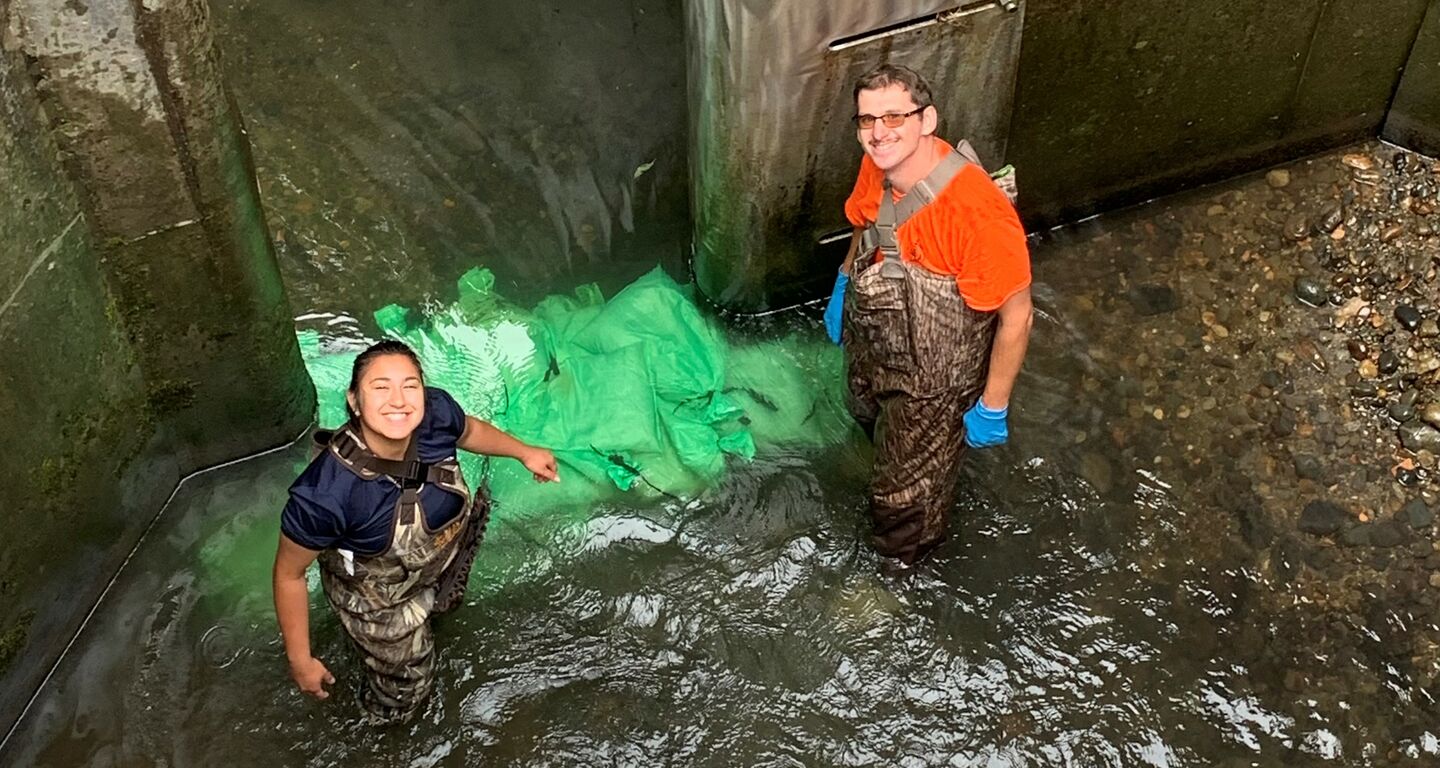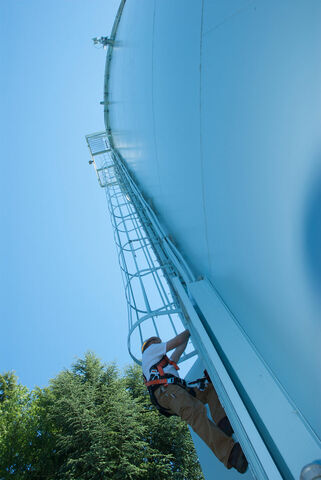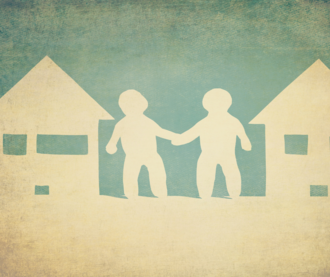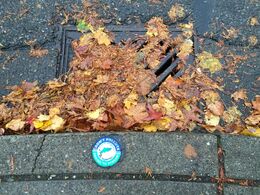Utilities Newsletter
March/April 2025
Celebrate Earth Month and Discover Ways to Protect Water Quality
This April as communities globally celebrate Earth Day, there is plenty to do locally. We enjoy the city’s streams, lakes and wetlands for their beauty and for recreation. These waterways are also home to salmon and many other types of fish and wildlife. As water from rainfall flows over rooftops, streets and yards, it picks up and carries pollutants such as fertilizers, soap, oil, antifreeze, dirt, pet waste, metals and solvents. This pollution flows directly into Bellevue’s storm drains and harms our streams, lakes, wetlands, and the wildlife living there.
What can you do?
There are easy ways to help keep our waterways free of pollution. Here is a good rule to remember: If you wouldn't drink it or swim in it, don't put it down the storm drain.
Actions you can take to prevent water pollution:
- Use fertilizers and pesticides sparingly or just use compost.
- Use a commercial car wash instead of your driveway.
- Fix car oil leaks and don’t overfill your gas tank to prevent runoff.
- Scoop pet poop, bag it, and throw it in the trash.
- Dispose of Household Hazardous Waste properly at the Factoria Transfer Station.
- Keep grass clippings, leaves, soil, and other debris away from storm drains
- Maintain septic systems properly. Drain swimming pools and spas properly.
- Volunteer! Learn more about the Stream Team volunteer group at BellevueWa.gov/stream-team.
Greener Living Community Classes
We are once again offering free community classes to help you make sustainable choices at home this spring. The popular “Greener Living” workshops are updated regularly based on need and interest. This spring includes a mix of virtual and in-person workshops to help you make sustainable choices year-round.
Spring 2025 workshop topics include the following:
- Choose to Reuse: Craft with Upcycled Materials
- Easy Repair: 3D Print Replacement Parts
- How To Get Rid of Anything: Recycling, Composting, Hazardous Materials and Unusual Items
- Make and Take Home Your Own Natural Cleaners
- Effective Strategies to Reorganize and Declutter at Home
For complete workshop listings, dates and times, visit BellevueWA.gov/greener-living-classes. Registration is required to attend. To register, email recycle@bellevuewa.gov or call 206-949-1787.
Curious about installing rooftop solar panels this year?
The City of Bellevue’s sustainability team wants all Bellevue homeowners to know about Solarize
Eastside’s benefits and discounts, and that enrollment starts March 1. Installing solar on your home has numerous economic and environmental benefits but, we understand that it can also feel like a daunting process, from perceived costs to technical details and figuring out which installers to choose. To address these challenges and support homeowners, the City of Bellevue is sponsoring Solarize Eastside, a solar group purchasing program used throughout the country to reduce costs and simplify the installation process. Solarize installers provide discounted prices, made-in-Washington equipment, and free public workshops to help answer all of your questions.
Workshops Dates: Wednesday, April 2 and Monday, May 19 at Bellevue City Hall from 6-8 p.m.
Solarize programs have accelerated residential solar adoption across Washington. The City of Bellevue’s sustainability team is encouraged by the opportunity to bring this program to Bellevue homeowners.
Sign up for a workshop and learn more at SolarizeEastside.org.
Jan/Feb 2025
How are utility rates determined?
Utility rates were approved by City Council as part of the City’s budget that was adopted in November after several months of presentations and review. Before the proposed budget reaches City Council, it is thoroughly reviewed by the Environmental Services Commission, a seven-member citizen advisory commission. A public hearing was also held to review public comments before the Commission provides a recommendation and City Council decided on approval.
What does Bellevue Utilities consider when setting rates?
- We want to maintain stable and predictable rates to avoid large rate increases in the future.
- We want to keep our rates competitive with neighboring cities.
- We want to meet the long-term needs of our customers and community.
- We want to ensure we provide the level of service expected by our community.
Learn more about Bellevue Utilities rates and budget at BellevueWa.gov/utility-rates
What does your utility bill pay for?
Bellevue Utilities provides essential drinking water, wastewater, and storm and surface water services that meet the needs of our growing community now and for generations to come.
Water
Water is fundamental to life. Providing safe, clean, and reliable water to households and businesses requires significant infrastructure. The City maintains over 600 miles of water main pipes and 24 reservoirs that can store over 40 million gallons. Aging pipes and water facilities require regular maintenance and planned upgrades to prevent service disruptions and ensure long-term reliability.
Wastewater
Once you have used water and it goes down the drain, it is safely collected and moved through over 600 miles of city-owned and maintained pipes to King County’s regional sewage system where it is treated. Ensuring the city’s sewer pipe system remains functional to prevent sewage overflows requires ongoing investment.
Storm and Surface Water
The City’s stormwater system helps prevent flooding by properly channeling excess rainwater away from streets and properties while protecting over 80 miles of open streams and more than 860 acres of protected wetlands, supporting fish and wildlife habitat.
2025-2026 Utility Rates
The combined utility bill, including water, sewer and storm service, will increase by 7.4% in 2025 and 6.8% in 2026 as approved by City Council. This includes external costs Bellevue Utilities pays to Cascade Water Alliance for water supply, King County for wastewater treatment, and city and state taxes. The new rate also reflects investments to maintain and manage the infrastructure needed to deliver utility services, as well as funding local operations.
How does this impact the typical residential bill?
The typical residential customer's average monthly bill in 2024 was $222.82. With the new rates, in 2025, the typical average monthly bill is $239.40. In 2026, the typical average monthly bill will be $255.71
Do you need help paying your utility bill?
The budget City Council adopted in November includes resource allocation to support the city’s utility bill assistance program, given that utility rates are rising across the region. We understand many households are facing financial hardship, and we want to make sure our customers are aware of their options.
Bellevue Utilities has both short-term and long-term assistance programs to help qualifying low-income, disabled, and senior residents in need of financial assistance. For details on qualifying and applying for bill assistance, visit BellevueWA.gov/utility-relief, call 425-452-5285 or email utilityrelief@bellevuewa.gov.
Donate to Neighbors Helping Neighbors
Neighbors Helping Neighbors is a new donation program that helps to support low-income residents unable to pay for essential utility services. When you make a donation to Neighbors Helping Neighbors, you are making a meaningful impact by helping someone in our community facing financial hardship and in need of assistance.
Anyone can make a donation at any time and every donation counts. No contribution is too small, and every dollar goes directly to providing financial assistance to a community member in need.
Learn more about Neighbor Helping Neighbors and make a donation at BellevueWA.gov/utility-relief.
Nov/Dec 2024 Newsletter
Cheers to Zero Waste Holidays
Did you know that nationwide, between November and January, consumers throw away a million tons of extra garbage each week? Consider implementing these five zero-waste practices to avoid excess waste while still making holiday memories.
- Limit leftovers. Waste less food after big holiday meals by sending guests home with leftovers in reusable containers and storing leftovers for longer-lasting freshness. See more tips for reducing food waste at BellevueWA.gov/recycle-food-waste.
- Ditch disposables. Say no to single-use plastic straws, utensils, and water bottles. A few extra dishes can save tons of plastic waste from landfill.
- Flatten and recycle cardboard boxes in covered recycling carts. This saves space, keeps cardboard clean and dry, and ensures your boxes can be made into new products.
- Wrap with reusables. Save durable items like bags, boxes, and bows for second use. Make it a family game to find the most creative zero-waste wrapping!
- Remember to recycle when the holiday is over. Most wrapping paper can be recycled in your curbside cart. Many organizations offer holiday light recycling collections, and you can compost your holiday tree and other greenery.
See your local recycling guide and KingCounty.gov/green-holidays for more ways to enjoy a zero-waste winter holiday season.
Preserving Trees for a Healthy Environment
The City Council approved updates to Bellevue’s tree protection codes this summer to help safeguard our vital tree canopy, which plays a crucial role in maintaining the health of our watershed. Trees are essential not only to Bellevue’s identity but also to our environment—they filter pollutants, manage stormwater, and provide critical habitat for wildlife.
The updated tree code now requires property owners to obtain a permit before removing any significant or landmark tree. For larger developments, a new “tree credit” system has been introduced, encouraging developers to preserve or replace trees to maintain our community’s tree density. More details are available at BellevueWA.gov/development-services.
Don’t Drip and Drive
During the rainy season, it’s more important than ever to fix car leaks. When oil from your car leaks, the rain carries it into storm drains and straight into our creeks, rivers, and Puget Sound. Oil and other petroleum products are toxic to people, wildlife, and plants. Make sure to check your vehicle for leaks regularly to protect water quality, people, and wildlife. For more information about vehicle leaks, visit FixCarLeaks.org. For more overall car care tips that help protect water quality, visit PugetSoundStartsHere.org.
Need Help Paying Your Utility Bill?
Bellevue Utilities has several programs to help qualifying low-income residents and residents facing financial hardship. For information on qualifying and applying for these programs, visit BellevueWA.gov/utility-relief, or contact us at 425-452-5285 or utilityrelief@bellevuewa.gov.





